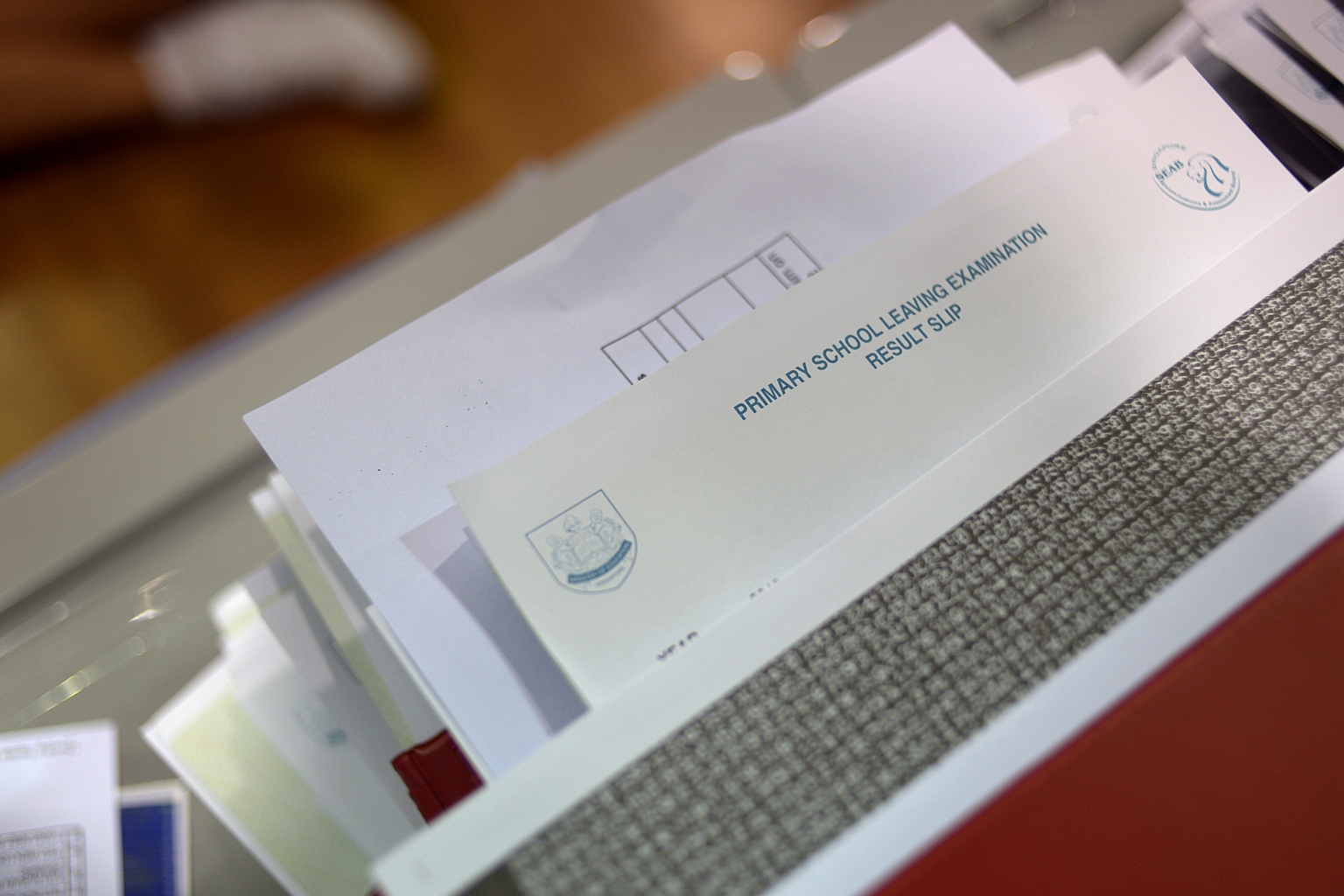PSLE: Changes to scoring system
PSLE changes: 8 Achievement Levels offer a good balance, says MOE
Pupils will not be pressured into chasing marks, but scores can still sort them for secondary school posting
Sign up now: Get tips on how to help your child succeed

Result slips for students taking the Primary School Leaving Examination.
PHOTO: ST FILE
Follow topic:
On the one hand, pupils should not be pressured into chasing that final mark in the Primary School Leaving Examination (PSLE). At the same time, scores should still be able to sort them meaningfully for secondary school posting, to cut down on computer balloting.
That is why there will be eight scoring bands from 2021 onwards, explained the Ministry of Education (MOE), calling it a "good balance".
"While there may not be any difference between a student who scores 65 and another who scores 66 in a subject, there is a difference between one who scores 65 and another who scores 75," the MOE said.
"If there are too few ALs, there will be more students with the same PSLE score, which will lead to more balloting in Secondary 1 posting. This would cause more anxiety for parents and students."
From 2021, pupils will be placed into eight Achievement Levels (ALs) for each subject. Those who get 90 marks and above for a subject will earn an AL1; 85 to 89 is AL2; and 80 to 84 is AL3 and so on. The bands get wider at the bottom - AL5 is a score of 65 to 74, for instance.
Some parents whom The Straits Times spoke to asked why the top scoring bands were placed so close together. Instead of chasing the last mark, pupils may be pushed to chase "the next five marks".
Others felt that the wider bands at the bottom could be demoralising for pupils with lower scores. For instance, five extra marks at the upper bands could see an improved PSLE score, but it could take as much as 20 marks at the lower bands.
Ms Kathleen Goy, 35, a marketing manager who has a six-year-old daughter, said: "For some pupils, every additional mark takes a lot of effort and yet, they will still end up within the same band."
MOE explained that the upper ranges are narrower as majority of pupils do well for PSLE. On average, about half the cohort will score AL4 or better. Finer bands at the top will help to differentiate students at these levels, while the middle to lower bands are "sufficient to give a good indication of a student's progress and further diffrentiation is less educationally meaningful."
One critical aspect of the changes welcomed by many parents is how a pupil's score will no longer be "transformed" relative to how his peers did. Instead, his actual score will be used. This is more transparent and easier to understand, said parents, a point highlighted by principals as well.

Tweaking scoring system unlikely to have much impact unless mindsets change too
It has been a long wait, but the Ministry of Education(MOE) finally revealed the details of the new Primary School Leaving Examination (PSLE) scoring system yesterday.
Many parents with pre-schoolers were relieved about the phasing out of the PSLE T-score, where each pupil is compared with his peers.
Under the new system from 2021, the score given to each pupil will be based on how well he has done in the subject, independent of how others fare.
Parents worry kids' weaker subjects will pull down results
Some parents are worried that their children will pay a bigger price for being weak in one subject, even though they excel at others, under the revamped Primary School Leaving Examination (PSLE) scoring system.
Under the current system, every mark matters. So higher T-scores in English, maths and science can make up for a lower score in Chinese, for instance.
But from 2021, scoring either 90 or 100 for a subject matters little, since the pupil still gets the same Achievement Level (AL) 1 score.
Choice of school and balloting may play bigger role
More pupils sitting the revamped Primary School Leaving Examination (PSLE) may have to undergo balloting to sort them into secondary schools under the new scoring and posting system.
With wider scoring bands replacing the current T-score system in 2021, more pupils taking the national exam are likely to come away with the same scores.
This could lead to more computerised balloting if many select the same secondary school.
Stress levels unlikely to fall - and may even rise
The Education Ministry made a few significant changes to the Primary School Leaving Examination (PSLE) yesterday.
My daughter will be in the last batch taking the PSLE under the current system. My two younger sons will be under the new regime, from 2021, so they will be directly affected.
Here's my take on the bad and the good of the changes in store.

